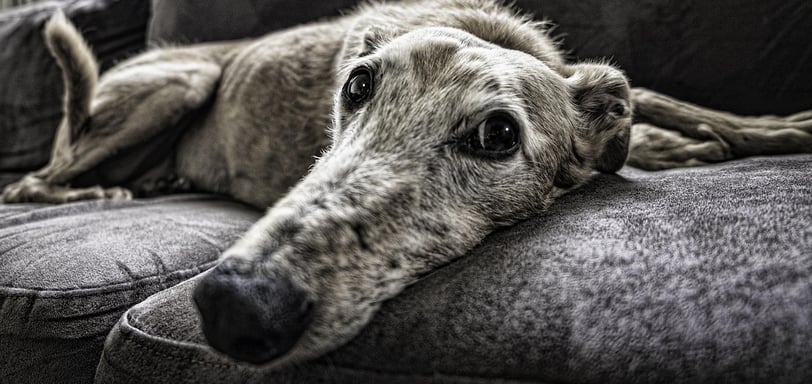Neurological Problems in Senior Dogs
This article provides detailed information on the most common neurological problems in senior dogs, such as seizures, cognitive dysfunction, degenerative myelopathy, and disc herniation. Learn about the causes, symptoms, and available treatments to help your pet maintain a good quality of life. Additionally, we offer tips on how to prevent and manage these conditions through regular veterinary visits, proper nutrition, and preventive care
PET CARE AND HEALTH


The nervous system is responsible for regulating all vital functions. In addition, it is involved in learning, behavior, and voluntary and reflexive movements of dogs. To function properly, it performs two essential functions: receiving information and sending responses, which can manifest as muscle contraction or relaxation, stimulation or inhibition of a gland or organ, or a specific behavior. All of this aims to maintain balance within the body.
For this reason, neurological diseases affect the entire body, and their causes can range from vascular, inflammatory, toxic, or metabolic issues to neoplastic, nutritional, or degenerative factors. As dogs age, they may experience changes in the nervous system, leading to a wide variety of neurological problems that can affect the spinal cord, brain, peripheral nerves, or muscles. In this article, we will explain the most common neurological problems in senior dogs to help you assist your friend and ensure they have a good quality of life.
Seizures
Seizures are not a disease in themselves; rather, they are a symptom of various diseases and alterations in the body. They are relatively common, especially in senior dogs. Seizures can be generalized or partial, and the dog may lose consciousness or not during the episode.
In any case, a thorough examination is essential, including a neurological exam, identification of the type of seizure, frequency of episodes, blood tests, ultrasounds, and chest and abdominal X-rays.
The causes are numerous and may include congenital malformations such as:
Hydrocephalus
Intoxications
Infections
Neoplasms
Metabolic or endocrine disturbances
Traumas
Treatment It will be the veterinarian who determines the cause of the issue to apply the appropriate treatment as soon as possible, aiming to prevent deterioration in the dog’s quality of life. Depending on the severity of the condition, it is possible to manage these episodes to reduce or even eliminate them entirely.
For more details, check out this article: "Seizures in Dogs: Causes, Treatment, and What to Do."
Cognitive Dysfunction
This condition, similar to Alzheimer's in humans, results from wear and tear of the central nervous system. The most common symptoms include:
Disorientation: The dog may become stuck in places it knows or in corners.
Changes in the sleep cycle: Dogs may walk around the house during the night and sleep during the day.
Loss of learning and memory.
Reduced affection: The dog may become less affectionate.
Treatment The causes can be metabolic, neurological, or sensory, and the treatment will depend on the origin of the problem. This may include symptomatic management if there is pain, appropriate nutrition, and the adaptation of a routine specific to their needs.
More details here: "Alzheimer’s in Dogs or Cognitive Dysfunction: Treatment and Symptoms."
Degenerative Myelopathy
Another neurological problem in senior dogs is degenerative myelopathy. This condition is common in large breeds like the German Shepherd and causes the following issues:
Weakness
Motor dysfunction
Paralysis in the hind limbs due to a degenerative and progressive problem in the spinal cord.
The most common symptoms include hind limb dysfunction and dragging, as well as progressive paralysis.
Treatment The treatment focuses on symptomatic management since there is no cure, though physiotherapy and exercise can help slow its progression.
The diagnosis is clinical and aims to rule out other conditions, such as disc herniation, tumors, infections, or other diseases. Although there is no specific cure for this condition, physiotherapy, aquatic rehabilitation, the use of a wheelchair, and medications can help maintain the dog’s quality of life and slow further deterioration as much as possible.
Disc Herniation
Disc herniation is a fairly common neurological problem in senior dogs. It occurs when one or more intervertebral discs compress the spinal cord or nearby nerves, causing pain, weakness, or even paralysis, depending on the affected area. The causes usually involve the degeneration of intervertebral discs over time, trauma, or genetic predisposition. Certain breeds, such as Dachshunds, Beagles, French Bulldogs, or Shih Tzus, are more likely to develop this problem due to the natural structure of their spine.
Symptoms include:
Pain when moving, standing up, or when touching the back
Stiffness or difficulty turning the neck
Decreased physical activity
Stumbling or limping. In severe cases, paralysis may occur.
Treatment The veterinarian will conduct physical and neurological tests to determine the severity and exact location of the hernia. The treatment is generally conservative, as there is no definitive cure. This approach includes:
Medications: Anti-inflammatory drugs, muscle relaxants, and pain relievers to alleviate discomfort.
Therapies: Physiotherapy, laser therapy, or acupuncture aimed at recovering mobility and strengthening muscles.
Rest: 4 to 6 weeks to avoid worsening the injury.
In severe cases, surgery may be recommended to decompress the spinal cord and more effectively relieve the symptoms.
More details in this post: "Disc Herniation in Dogs: Symptoms, Treatment, and Recovery."
Metabolic Diseases Affecting the Nervous System
Some metabolic diseases can affect the nervous system, usually as a result of other problems in vital organs, metabolic disorders, or endocrine issues. The most common symptoms include disorientation, weakness in the limbs, and seizures.
The causes are varied, and some of the most frequent include:
Low blood sugar levels (hypoglycemia)
Thyroid gland dysfunction (hypothyroidism)
Low blood calcium levels (hypocalcemia)
Diabetes
Cushing’s Syndrome
Treatment The treatment will depend on the specific cause, so it is crucial for a specialist to evaluate your dog and apply the appropriate treatment promptly to avoid worsening the condition. This will require blood tests to measure parameters such as calcium levels, glucose, kidney and liver function, and hormones, along with ultrasounds and other specific tests as necessary.
What to Do to Prevent and Control Neurological Problems in Dogs?
As you can see, almost all neurological problems in senior dogs need to be assessed by a veterinarian as soon as possible to apply the correct treatment. Delaying treatment can make it difficult for your dog to lead a normal life.
However, here are some tips that can help you assist your dog in coping with these issues and prevent them:
Regular visits to the veterinarian: Take your senior dog to the vet at least twice a year to detect problems in their body that could lead to neurological issues.
Balanced nutrition: A balanced diet is essential to prevent imbalances in the body. Omega-3 fatty acids, antioxidants, and vitamins promote neurological health. It is important to adapt the diet to your dog’s age.
Weight control: Manage your dog's weight to prevent and improve problems like disc herniation or myelopathies.
Use of harnesses instead of collars: Try not to use collars; harnesses will prevent damage to the neck and spinal cord.
Avoid abrupt physical activities: Avoid allowing your dog to jump or perform sudden physical activities that could lead to injuries or worsen existing ones.
Pay attention to behavioral changes: If you notice any changes in your dog’s behavior and suspect they may be ill, don't hesitate to visit the veterinarian to rule out issues like infections, which, if left untreated, can affect your dog's nervous system.
Keep vaccinations and deworming up to date: Keep a proper vaccination and deworming schedule, as diseases like distemper or intestinal worms can also cause neurological damage.
Mental stimulation: Stimulate your dog mentally with interactive games and training to keep the brain active.
Avoid stressful situations that may trigger nervous problems like seizures.
This article is purely informational; Dogs-Hoper does not have the authority to prescribe veterinary treatments or make any diagnoses. We encourage you to take your pet to the veterinarian if they show any signs of illness or discomfort.


